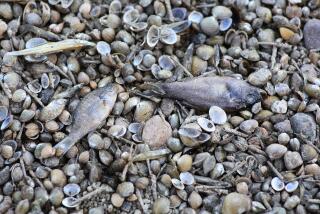Tigris, Once the River of Life, Is Dying
- Share via
BAGHDAD — The wooden boats are patched and painted on the shore, and Lufti Mahmoud, his hands as coarse as fishing nets, pushes his skiff into the Tigris and glides against the current, remembering boyhood days when spice barges rode the fat river south to Basra and beyond.
The water was 30 feet deep then and full of shabbut, an elegant pink fish narrower than a carp. Somewhere between his childhood and advanced years, Mahmoud’s river changed, turning muddy and shallow. He steers his 25-horsepower motor west, past fading villas built long ago by the Ottomans and the British, and toward new prints left upon the shore by American soldiers.
The river is past and present mixed.
“The Tigris represents the country,” he says. “It has to be rejuvenated. We must re-create what we’ve lost.”
Riding the Tigris is like sliding across the backbone of Baghdad. From his seat in the bow, Mahmoud watches seagulls streak a blue sky. Coils of smoke rise here and there over the ruins of Saddam Hussein’s regime. Sometimes there is the crack of gunfire, the sound of a grenade echoing from a Baghdad street, but Mahmoud keeps his mind on the river, letting others worry about this nation’s unfinished war.
The boatmen of the Tigris have endured for centuries. They have survived tyrants and droughts, and they know the bends and dangers of a river that flows about 1,150 miles -- from the Taurus Mountains in eastern Turkey through the Mesopotamia Valley to the ancient Iraqi city of Al Qurna, where it unites with the Euphrates before emptying into the Persian Gulf. Throughout history, the boatmen have watched as the river delivered intruders and whisked away the vanquished.
“The years of Saddam were expensive and uncomfortable. The same as now,” Mahmoud says, skimming past the river reeds and half-sunken cargo ships that tilt toward shore. “There’s not much change. I get my daily expenses, and that’s it.”
The water ripples and Mahmoud waves to a fisherman fumbling with nets in a nearby boat. Humvees patrol the shore beyond, and U.S. soldiers wearing goggles keep their heads low and grip .50-caliber machine guns.
“Last year’s war came during fishing season,” Mahmoud says. “We’d see planes and missiles from the water. When there were no bombs, we’d do our work on the river. When the missiles came, we’d hide. We weren’t scared. The Americans weren’t trying to kill us, but you never knew when a missile might hit you by mistake.”
The Tigris is muted browns and greens and tainted with chemical pollution. Sewage courses like a long black snake through the water, twisting south for miles before vanishing. Dams for hydropower and irrigation in Iraq and Turkey hold back millions of gallons of water, and sometimes the Tigris, the river of the Bible and the Koran, seems a thread running through the desert.
The fish -- shabbut, gittan and bunni -- used to be plentiful year-round. Now Mahmoud casts his nets only from March to July. The other months he is a ferryman, charging customers 40 cents to ride from one bank to the other in his 18-foot wooden boat with peeling brown and white paint and a rusted three-pronged anchor.
“My father was the captain of a cargo boat,” he says. “He’d carry 400 tons of wheat and sugar back and forth from Basra. On school vacations, I’d go with him.... The river seduced me. I became a fisherman. I had a rowboat. It didn’t disturb the water and scare the fish the way these motorboats do. You’d throw out your nets and let them settle on the riverbed, and you could feel the pull of the fish.”
Mahmoud steers toward deeper water and passes under a bridge and back into sunlight, where gouged buildings dot the skyline and carpets dry on the riverbank. The wind shifts behind him. His boat hums toward another bridge, this one built decades ago by the British -- former colonizers -- for freight trains. Cars and donkey carts race across it today.
There used to be a customs depot by the bridge to tax the big boats moving north and south. There were fish markets too. Gone.
“It was once a lively route,” Mahmoud says. “But Saddam shut down the river business. His regime wanted to control everything. They used trucks and trains and forgot about the river, and then the water levels kept dropping and navigation for big boats became harder.”
Mahmoud is quiet on the river. When he speaks, it is mostly about nature and the way landscapes subtly, and sometimes dramatically, conform to time. He has only one big fish tale to tell -- it weighed 90 pounds and took 45 minutes to land. The rest of the time has been spent alone on the water, the slap of an oar, the whoosh of a net. He sent two daughters to college, even took a trip to Austria once.
He is a man of interesting fashion: a thin, half-shaven face, a black-and-white kaffiyeh wrapped around his head, an old gray blazer over a brown tunic, green socks and black loafers. All faintly stained with oil and grease. He moves deftly in his boat, light as a spirit on the water. He knows river myths.
“Two hundred years ago,” he says, “a lion stood on the riverbank drinking water. A barracuda sneaked up and bit the lion on the mouth. The lion bled into the water and the barracuda came back to drink the blood. The lion waited for the barracuda to get closer and then snatched the fish with his paw and tore him to pieces on the shore. The lion was patient and got his revenge.”
Over the last 20 years, Mahmoud and other fishermen were forbidden from entering the waters near Hussein’s palaces. These days, they drop anchor where they please.
“I never saw Saddam on the river,” he says, “but sometimes I’d see his son, Uday, pass on a yacht.”
Mahmoud looks over the Tigris. The number of boats seems smaller each year. The young are less interested in the river and speak of leaving Baghdad.
Mahmoud has no son to inherit his craft. He glides to shore. Another boatman is fixing an engine. Boys play at the water’s edge and then disappear into alleys crowded with carpenters and butchers, and the smells of blood and oranges.
Mahmoud’s house is the color of mustard. It sits between two bridges, the Tigris rolling nearby, the voices of watermen never far away.
“The river will never vanish,” he says. “As long as it is here, there will be something.”
More to Read
Sign up for Essential California
The most important California stories and recommendations in your inbox every morning.
You may occasionally receive promotional content from the Los Angeles Times.














